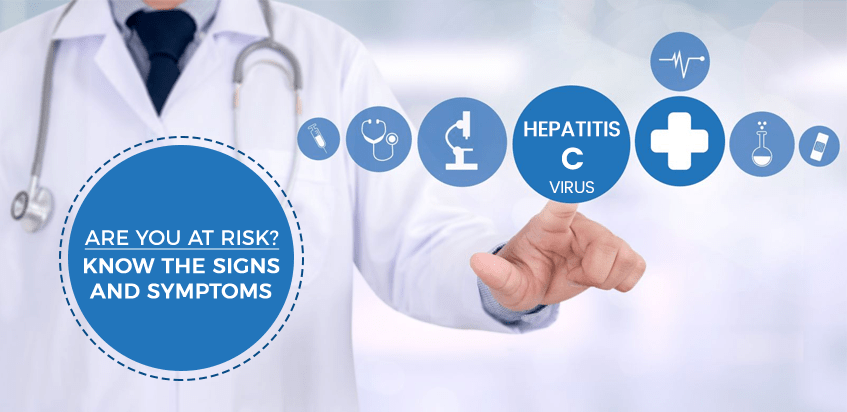Unfortunately, due to lack of awareness most Hepatitis C virus patients do not know that they are suffering from this fatal disease until it’s too late. Therefore, it is of utmost importance that we understand the Hepatitis C symptoms so that the patients can start their Hepatitis C treatment and avoid its transmission to others.
What is Hepatitis C?
Hepatitis C is a serious health condition, affecting 130-175 million people in the world. If left untreated it can cause inflammation in the liver and damage your liver. According to the Centers for Disease Control and Prevention (CDC), about three in four people who have been infected haven’t been diagnosed. That is extremely disturbing, because the sooner you start hepatitis C treatment, the better your chances of being cured.
Hepatitis C is a disease that causes inflammation and infection of the liver and this condition develops after the patient is infected with the hepatitis C virus (HCV). Hepatitis C can be either acute or chronic.
However, they are more commonly referred to as a family of viral infections that affect the liver. Hepatitis A, Hepatitis B and Hepatitis C are the three most common forms of Hepatitis. Out of these three viruses, Hepatitis C is the only one for which no vaccine is avaiable to protect against infection.
Sadly, like hepatitis A and B, there’s no vaccine for hepatitis C, although efforts to create a hepatitis C treatment continue. Hepatitis C is highly contagious, which explains the high number of people affected by this disease.
How does Hepatitis C Spread?
This condition can result from a variety of causes that include exposure to various toxins, some prescription and over the counter drugs, heavy alcohol consumption, or a number of bacterial and viral infections. The most common means of contracting the virus is through infected needles or syringes, this may happen in one of the following ways.
- Accidental needle injuries in health care settings.
- Body piercings or tattoos done with unsterilized, reused equipment.
- Directly through the skin contact with the blood of an infected individual.
- Sexual interaction with an infected individual.
- Transmission from an infected mother to an unborn child.
- Blood transfusions
- Sharing of needles or syringes by drug users.
Hepatitis C Symptoms
In about 15 to 25 percent of individuals who have become infected with Hepatitis C Virus, the disease may develop a short term condition called acute Hepatitis C infection. Typically, acute hepatitis C is cleared from the body by the immune system without any Hepatitis C treatment, generally within a few months. In acute Hepatitis C symptoms, on average, occur within 6 to 7 weeks of exposure, but can appear as much as 6 months after infection.
For finding the cure for hepatitis C, it is essential that we understand the symptoms that may present before the disease takes a fatal form, the following list of symptoms can help you treat this dangerous condition in time:
- Fever
- Fatigue
- Nausea
- loss of appetite
- muscle aches
- Vomiting
- Loss of appetite
- Abdominal pain
- Jaundice (yellowing of the skin and/or the whites of the eyes)
- Dark, concentrated urine
- Pale or clay-colored stool
- Joint pain
For the majority of infected individuals, about 75% – 80% patients, Hepatitis C becomes a chronic, lifelong condition. Chronic Hepatitis C infection, in most cases, presents no symptoms or very mild ones. The lack of defined symptoms often lead to the disease remaining undetected for years, often until affected individuals develop liver damage, cirrhosis, or liver cancer, which can often occur as a result of the severe liver scarring that characterizes cirrhosis.
As cirrhosis develops, symptoms and signs increase and may include:
- Elevated liver enzymes in the blood
- Weakness
- Loss of appetite
- Weight loss
- Breast enlargement in men
- Redness of the palms of the hands
- Difficulty with the clotting of blood
- Spider-like blood vessels on the skin
- Abdominal pain
- Clay colored stools
- Bleeding from the esophagus
- Fluid in the abdomen
- Yellow skin and eyes (jaundice)
- Confusion
- Coma
Very few patients experience hepatitis C symptoms or signs such as dark urine, yellow eyes, or clay colored stools in acute or early infection. Over time, people with chronic Hepatitis C Virus infection may develop signs of liver inflammation which suggests that the infection may be present. Infected individuals can become easily fatigued or complain of nonspecific symptoms.
Although there is no vaccine cure for Hepatitis C but some medications you can buy Hepcinat LP tablets online but with a prescription from the doctor as all of them are prescriptioned medicines.

